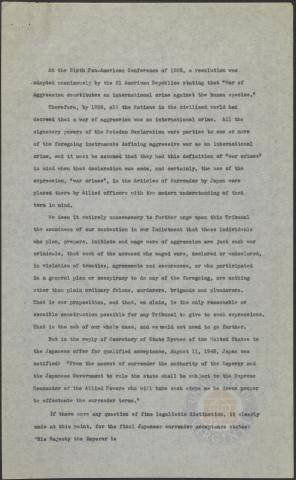
Page 11
| Parent | Remarks to Court on the motion attacking the jurisdiction of the Tribunal |
|---|---|
| Date | June 1946 |
| Language | English |
| Collection | Tavenner Papers & IMTFE Official Records |
| Box | Box 3 |
| Folder | General Reports and Memoranda from June 1946 |
| Repository | University of Virginia Law Library |
At the Sixth Pan-American Conference of 1928, a resolution was adopted unanimously by the 21 American Republics stating that “War of aggression constitutes an international crime against the human species.”
Therefore, by 1928, all the Nations in the civilized world had decreed that a war of aggression was an international crime. All the signatory powers of the Potsdam Declaration were parties to one or more of the foregoing instruments defining aggressive war as an international crime, and it must be assumed that they had this definition of “war crimes” in mind when that declaration was made, and certainly, the use of the expression, “war crimes,” in the Articles of Surrender by Japan were placed there by Allied officers with the modern understanding of that term in mind.
We deem it entirely unnecessary to further urge upon this Tribunal the soundness of our contention in our Indictment that those individuals who plan, prepare, initiate and wage wars of aggression are just such war criminals, that such of the accused who waged wars, declared or undeclared, in violation of treaties, agreements and assurances, or who participated in a general plan or conspiracy to do any of the foregoing, are nothing other than plain ordinary felons, murderers, brigands and plunderers. That is our proposition, and that, we claim, is the only reasonable or sensible construction possible for any Tribunal to give to such expressions. That is the nub of our whole case, and we would not need to go further.
But in the reply of Secretary of State Byrnes of the United States to the Japanese offer for qualified acceptance, August 11, 1945, Japan was notified: “From the moment of surrender the authority of the Emperor and the Japanese Government to rule the state shall be subject to the Supreme Commander of the Allied Powers who will take such steps as he deems proper to effectuate the surrender terms.”
If there were any question of fine legalistic distinction, it clearly ends at this point, for the final Japanese surrender acceptance states: “His Majesty the Emperor is
